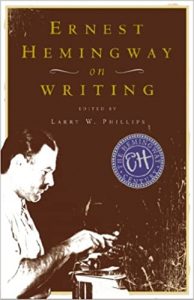EDITOR’S NOTE: Today we’re introducing Marissa Dunham as our newest member of the O.C. Writers’ Leadership Team. Every month, she’ll review and share her thoughts on books about the craft and business of writing in MARISSA’S TAKE ON… Welcome aboard, Marissa!
By Marissa Dunham //
 Books on writing have been around for a while, but they don’t always get the attention they deserve. Your favorite author has probably written one, and you may not even know it.
Books on writing have been around for a while, but they don’t always get the attention they deserve. Your favorite author has probably written one, and you may not even know it.
This is the first column in a series that will review books on how to write. You will see writing tips and advice for beginners and advanced writers and all writers in between.
Let’s start with the basics.
Ernest Hemingway on Writing edited by Larry W. Phillips
Hemingway is a master storyteller. When you’re learning how to write dialogue, you’ll likely have read his short story: “Hills Like White Elephants.” His longer works, like A Moveable Feast and For Whom the Bell Tolls, are excellent pieces for studying character development and dialogue. And he has written numerous other novels, articles, and short stories that have intrigued writers for years. There’s even an app with a version for your desktop called the Hemingway app. The app highlights your sentences and shows you where you can make edits like Hemingway.
One of my favorite portrayals of Hemingway is in Midnight in Paris, a great movie about writers–with the perk of having a time travel element. Any time I think of Hemingway, I am always picturing how Corey Stoll portrayed him. Decisive. Dedicated to writing. And a man of few adverbs.
He is a fascinating writer for those who want to learn the craft, but Hemingway did not exactly write On Writing.
Why, you ask, did I say this was a review of a book by Hemingway?
Because the words belong to Hemingway. He just didn’t intend for them to be read all in one go.
According to the foreword and the preface of On Writing, Hemingway believed it was bad luck to talk about the craft. For Hemingway, showing or talking about how to write for an extended length of time could interrupt his author’s mindset; his connection to that intangible thing that makes all writers jump to the page with pen in hand.
Luckily for us, editor Larry W. Phillips wasn’t so superstitious.
Phillips collected the writing advice from Hemingway from his personal letters, interviews, short stories, and novels to create this wonderful book. Without him, we’d probably not have everything that we do.
It’s a quick read. At 140 pages, you shouldn’t have much trouble. The advice is given as a series of quotes and short paragraphs. So you can fill up your warm-ups with inspirational quotes. Or, you can enjoy the whole book at your own pace.
On Writing is good for writers of all levels. Of greatest interest to writers looking to establish a writing routine are “Working Habits” and “The Writer’s Life.” If you need a title, “Titles” is a good chapter to get you started. For advanced writers in need of inspiration, read “What Writing Is and Does,” “The Pain and Pleasure of Writing,” and “Knowing What to Leave Out.” “Characters” is good for character development and gives advice about using real people in your fiction. For writers just beginning to get the hang of things, “The Pain and Pleasure of Writing,” provides great reminders about why you fell in love with writing in the first place. Writers interested in Hemingway’s life would enjoy “Obscenity,” “Titles,” “Other Writers,” and “Politics.”
Though I mentioned the chapters on writing routines earlier, I want to give you a taste of what makes those sections special.
You may have heard pieces of Hemingway’s routine. In these chapters, you’ll get all the details. How he would get up early in the morning to write every day. How much he would write. His advice on how to use your routine to keep writer’s block away. And much more. His advice is invaluable, and I cannot recommend this book enough for those who want to improve their writing.
When you read old letters and interviews, remember that they were written in a different time, with a different heart. If I were editing On Writing today, there would be a couple quotes I’d leave out. Know that you might not agree with everything Hemingway says about writing or the world. But, you get to decide what value you get from reading this book. Be intentional. Be sensitive. Hemingway has great advice for writers of all levels. Read with the eye of an inheritor. And take from this book only that which is true and good.
Leave a comment about your favorite piece of writing advice below.

MARISSA DUNHAM is a writer and freelance editor. She spent the early part of her career in educational publishing, but now spends most of her time editing literary fiction, magical realism, and middle grade fiction. She lives in Southern California, where she enjoys bringing new life into the world by planting tomatoes and flowers in the garden.


One can always learn from Hemingway. He’s my favorite author.
Joan Ramirez
entrepreneurial trainer
historical fiction author